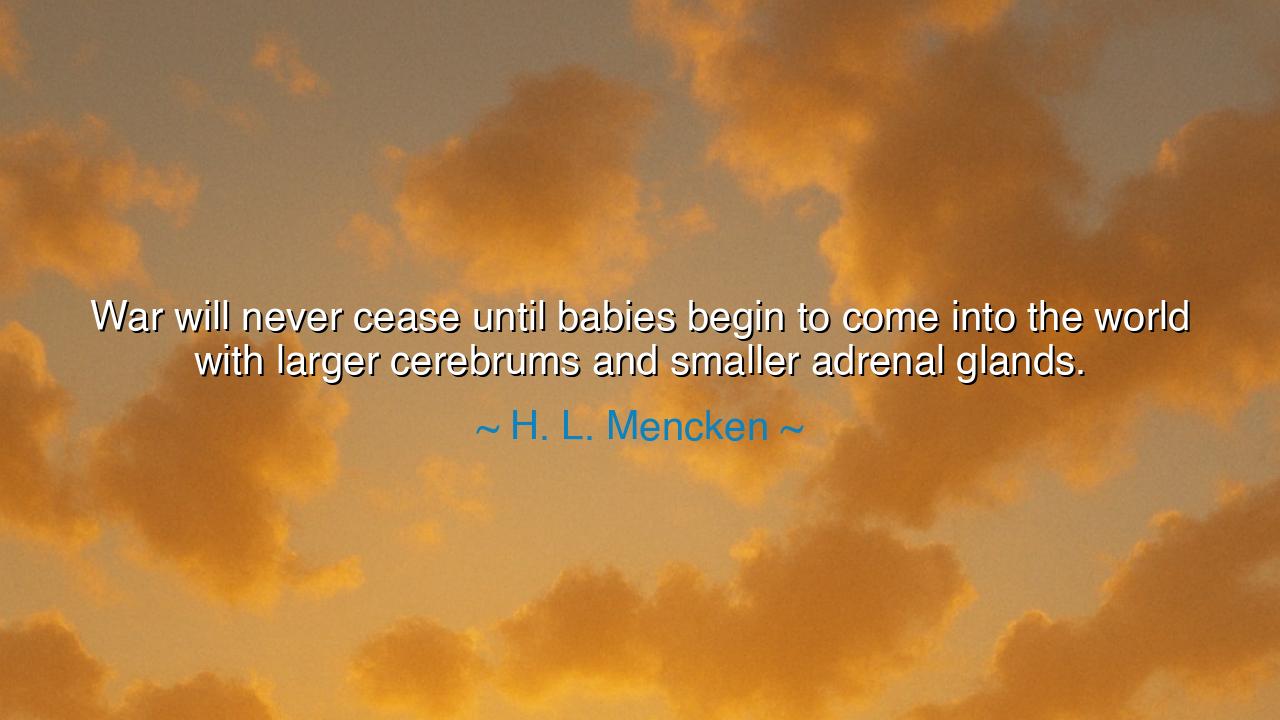
War will never cease until babies begin to come into the world
War will never cease until babies begin to come into the world with larger cerebrums and smaller adrenal glands.






The words of H. L. Mencken — “War will never cease until babies begin to come into the world with larger cerebrums and smaller adrenal glands.” — strike like thunder across the centuries. In this saying lies a bitter but profound truth: that the roots of conflict do not dwell in the weapons men wield, but in the very structure of their minds and bodies. Mencken, ever the sharp observer of human folly, reminds us that violence is born of instinct, of passion ungoverned, of fear and rage surging from the adrenal glands. Yet peace requires the dominion of reason, the guiding light of the cerebrum, the seat of wisdom, foresight, and compassion.
What does it mean, then, to long for larger cerebrums? It is to hope for a humanity that thinks before it strikes, that contemplates before it destroys. It is to yearn for reason to triumph over impulse, for intellect to bridle anger, for imagination to envision not the clash of armies but the harmony of peoples. And what of smaller adrenal glands? It is the wish that our primitive reflexes, the quick rush to violence, be diminished — that we no longer answer fear with fury, insult with blood, or difference with destruction. Mencken’s words, though cast in jest, conceal a prophecy: until man evolves, war will stalk the earth.
History testifies to this truth with sobering clarity. Consider the First World War, that great calamity which Mencken himself lived through. Nations plunged into battle not through reasoned necessity, but through pride, alliances, and reflexive rage at insult. Millions perished, and yet what was gained? The adrenal glands ruled, and the cerebrums of statesmen were too weak to resist the drums of battle. The carnage was proof that humanity’s instincts, unchecked by reason, would lead it again and again into the abyss.
Yet history also offers glimpses of what might be when the cerebrum prevails. Think of the Cuban Missile Crisis of 1962. The world teetered on the brink of nuclear annihilation, adrenal fear urging both sides toward destruction. But in that dark hour, John F. Kennedy and Nikita Khrushchev turned to reason. They sought dialogue, back-channel communication, and compromise. For once, the cerebrum outweighed the adrenal surge. The crisis passed, and millions lived because reason triumphed, however briefly, over instinct. This is the vision Mencken pointed toward: a humanity wise enough to bridle its primitive fires.
His quote also reveals a paradox: though he speaks of biology — of babies born with different organs — the true battlefield is not flesh but spirit. Evolution of the body is slow, but the evolution of the mind can be hastened. Education, culture, philosophy, and the practice of compassion all serve to enlarge the cerebrum, to train humanity to pause, to question, to imagine better ways. Likewise, spiritual discipline, meditation, and the cultivation of patience can shrink the hold of the adrenal glands, calming the rush of anger before it floods the soul.
The lesson is clear: if you would end war, begin not with armies, but with yourself. Expand the power of your own cerebrum — seek wisdom, question impulses, learn to think deeply before acting. Restrain your adrenal glands — breathe before anger rules you, pause before vengeance consumes you. Teach your children the same. In every home, every school, every community, this labor must be done, for peace is not born on battlefields but in the discipline of the human heart and mind.
Practical steps follow easily: read not only to acquire knowledge but to expand empathy. When provoked, choose patience over rage. When differences arise, choose dialogue over violence. Support leaders who think, not those who merely shout. And most of all, remember that the true evolution Mencken envisioned is not only of the body, but of the soul. Each of us may grow a larger cerebrum and weaken the grip of the adrenal glands through practice, reflection, and love.
So remember, child of tomorrow: Mencken’s jest was in truth a prophecy. War will not cease until we choose to govern our instincts with reason, until we allow the light of wisdom to outshine the fire of rage. Do not wait for new babies to be born different; become yourself the one with a greater mind and a calmer spirit. In this way, you will be the living answer to his words — and a seed of the peace the world so desperately seeks.






AAdministratorAdministrator
Welcome, honored guests. Please leave a comment, we will respond soon